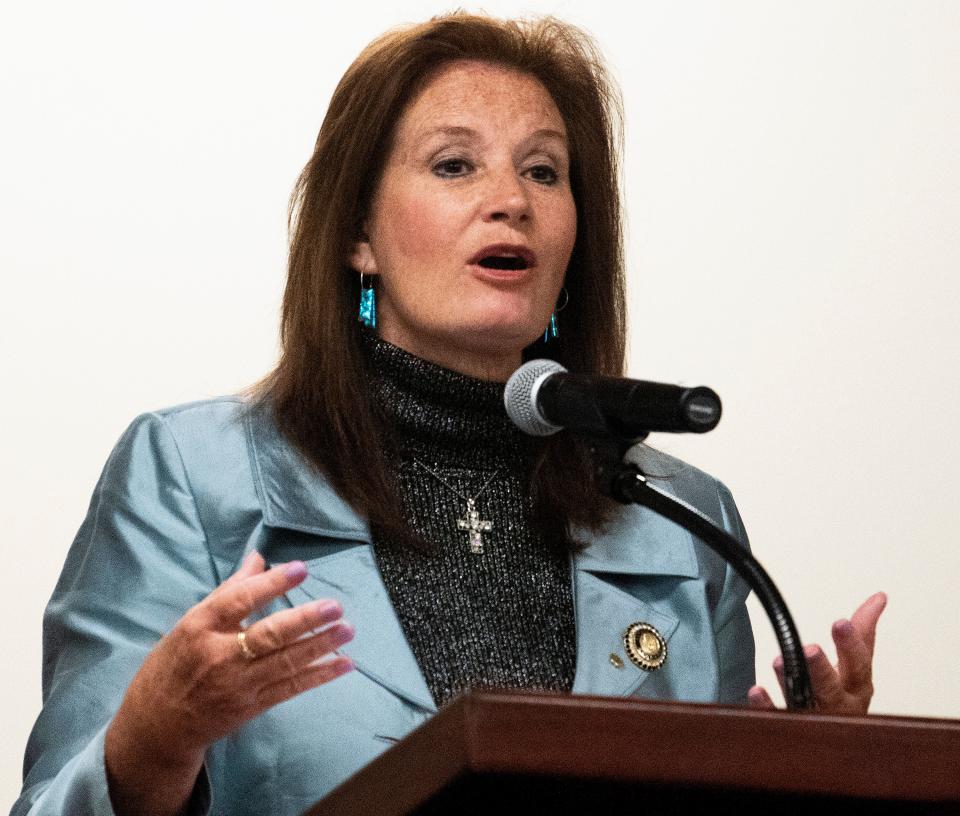Alabama abortion bill: What happens next for most restrictive ban in US in 40 years?
MONTGOMERY, Ala. – The Alabama Senate has passed a near-total ban on abortions that would essentially prohibit the procedure statewide.
If the bill becomes a law, performing an abortion would be considered a Class A felony, which carries a sentence of life or 10 to 99 years in prison. The bill, sponsored by Rep. Terri Collins, R-Decatur, was passed by the Alabama House last month.
The Alabama vote comes just more than a week after Georgia passed its own "fetal heartbeat" bill, which is now one of the most restrictive anti-abortion laws in the nation.
Here's everything you need to know about Alabama's abortion bill, what it contains and what happens now that it's passed in the Senate.
What are the abortion bill's details?
Rep. Terri Collins, the bill's sponsor, says the abortion bill aims to create a legal challenge to Roe v. Wade, the 1973 U.S. Supreme Court decision that struck down state bans on abortion in the first trimester of pregnancy.
Alabama state law currently outlaws abortion after 20 weeks into the pregnancy, unless it's to protect the women’s health or in cases involving rape or incest. The new bill would remove that 20-week restriction, essentially outlawing abortions entirely.
In addition to making performing an abortion a Class A felony, the bill would also make attempting to perform one a Class C felony. The resulting penalty for an attempted abortion under the new law would be a prison sentence of one to 10 years.

Does the bill make exceptions for rape and incest?
Earlier this week, Senate Democrats introduced provisions to the bill that would allow for exceptions in cases involving rape or incest. Those provisions were rejected in the Senate on Tuesday, though, meaning the bill will move forward without any such exceptions.
In the House, Republicans also rejected an amendment to provide exceptions for victims of rape and incest.
The bill does include exceptions for when the life of the mother was at risk; when the fetus had a lethal anomaly that would result in stillbirth or death after childbirth, or when a mental illness could lead to the woman’s death or that of her child.
Will Alabama's governor vote 'yes' on the bill?
Now that the bill has passed the Senate, it will go to Gov. Kay Ivey's desk for her approval.
The governor hasn't said anything regarding whether or not she will sign the bill, or what conditions she might attach to it.
"As this legislation is still making its way through the legislative process, the governor intends to withhold comment until it makes its way to her desk for signature," Lori Jhons, a spokeswoman for Ivey, wrote in an email on Monday.

Still, Republicans hold 27 of 35 seats in the Senate, so even if Ivey vetoed the measure, the Legislature can override any veto by simple majority votes.
How would Alabama's law compare to Georgia's 'fetal heartbeat' law?
The Alabama law is more restrictive than the "fetal heartbeat" bill passed in Georgia last week.
Under the new Georgia law, abortions would be illegal after about six weeks of pregnancy, which is when a heartbeat can be detected in the womb. Mississippi, Ohio and Kentucky have all passed similar laws that ban abortions after a heartbeat is detected.
Alabama's bill goes further. If passed, the provision would ban abortions entirely, except in particular cases such as if the mother's life is at risk.
What abortion access is currently available to Alabama residents?
If Ivey does sign the bill into law, it won't take effect for six months. That means, that time, Alabama residents will still have the same access to abortion resources as they do now. Here's what that looks like.
There are just three abortion clinics left in the state, according to the National Abortion Federation's database: The Alabama Women's Center for Reproductive Alternatives in Huntsville, the West Alabama Women's Center in Tuscaloosa and the Reproductive Health Services of Montgomery in Montgomery.
Alabama-based groups such as P.O.W.E.R. House and national organizations like Planned Parenthood and Pro-Choice America also offer additional information and resources.
This article originally appeared on Montgomery Advertiser: Alabama abortion bill: What happens next for most restrictive ban in US in 40 years?

